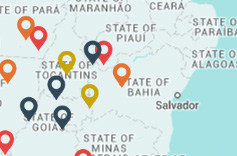Popular World Cup Committee of Porto Alegre (Rio Grande do Sul)
Popular World Cup Committee: resistance and empowerment from popular action
Rio Grande do Sul
Objectives and target population:
The project will consolidate the Popular World Cup Committee of Porto Alegre, increasing its relevance as a force for resistance and political proposals to combat human rights violations that have been occurring due to preparations for upcoming World Cup events in the city.
The Committee will be active on two fronts: disseminating information on specific legislation arising from the World Cup, from the perspective of exceptions to and violations of constitutional rights; and mobilizing the population to prevent forced evictions and/or guarantee the rights of those previously relocated due to projects related to the event. No less than 8,000 families who are threatened with removal will directly benefit from the project.
The proposal looks to increase the number of local groups active in the capital of Rio Grande do Sul, creating new popular committees, while also increasing and diversifying networks and coverage of existing groups. Thus they hope to have greater repercussions vis-à-vis the World Cup’s impact on society in general.
Main activities:
– Establishing and promoting the organization of the groups’ internal communications, among the different fronts;
– Offering legal assistance on which to base potential lawsuits in search of the guarantee of the affected populations’ rights;
– Creating networks based on socially-sourced maps to form new groups, with an emphasis on local formal and informal businesses;
– Holding collective efforts to support rights throughout the territories, with activities in public spaces to disseminate knowledge about human rights;
– Promulgating the “Key by key” campaign to demand that removed families receive new housing;
– Organizing marches and public acts, besides producing and disseminating news via printed materials, blogs and social networks on the internet.
Context:
As one of the seats of the 2014 World Cup, Porto Alegre already demonstrates the effects of the mega-event. The policy of forced removals is one of the main problems. Around 8,000 families will be obliged to migrate far from urban centers, from their original locations and places of work, due to expected projects, including the expansion of the runway at Salgado Filho airport and the widening of Moab Caldas Avenue (better known as “Tronco Avenue,” in the Cristal and Grande Cruzeiro neighborhoodsof southern Porto Alegre).
Another impact will be felt in peripheral areas. Even with minimal infrastructure and precarious social services, these locations will receive an exorbitant influx of new residents in the coming period. The massive construction of small-scale enterprises supported by the federal government’s “My House, My Life” program has already begun in the rural outskirts of the city, known as its “green belt,” which has hurt subsistence farmers.
The lack of information makes it difficult to face these problems. According to the Committee, the possibilities for participation created by government organs are not adequate.
About the organization:
The mission of the Popular World Cup Committee of Porto Alegre (CPC-POA) is to consolidate a process of resistance and popular empowerment against the human rights violations resulting from the organization and preparations of the city of Porto Alegre to receive the 2014 World Cup. Part of their directive is to produce counter-factuals, disseminate relevant information and create publications that can speak out and publicize to the population at-large the social, environmental, urbanistic and economic impacts of the sporting mega-event.
Currently the strongest committees in the city are concentrated in two territories, in Morro Santa Teresa and Cristal – both close to the Beira Rio stadium, which will hold the games.
Partnerships:
The committees are a part of Ancop – the National Network of Popular World Cup Committees.
Funding Line
Urban Development (2012)
Year
-
Total Granted
-
Duration
-
Main Themes
The right to just and sustainable cities






